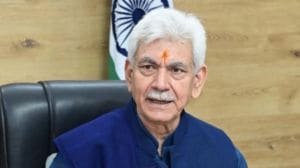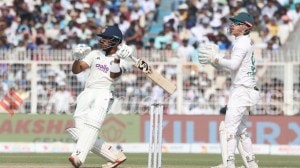Fiji’s military defends martial law, rules out military court
SUVA, JUNE 11: Fiji coup leader George Speight made a surprise move to garner support from a key figure in the suspended civilian governme...

SUVA, JUNE 11: Fiji coup leader George Speight made a surprise move to garner support from a key figure in the suspended civilian government on Sunday. Speight left the parliament building where his men were holding the Pacific nation’s former Prime Minister Mahendra Chaudhry at gunpoint and travelled a short distance across the capital, Suva, to the official residence of ex-vice president Ratu Josefa Iloilo.
He entered the building without speaking to reporters and the meeting continued for more than an hour. Speight’s talks with Iloilo are almost certain to centre on the future make-up of Fiji’s government, the sticking point holding up a peaceful resolution to the three-week-old crisis. Chaudhry was removed from power by former President Ratu Sir Kamisese Mara in an attempt to appease Speight. Along with Iloilo, Mara was himself then suspended from government on May 29 when the Army declared martial law after Speight’s supporters rioted through Suva.
Speight has so far quarrelled with all rival claimants to power, from Chaudhry to Mara and finally the military, over the shape of Fiji’s future government, refusing to release his hostages until he is satisfied. Sunday’s talks with Iloilo are the first time the former businessman has openly sought allies within the political establishment and came after calls from some western tribal chiefs that Iloilo be the next President.
Mara, whose authority Speight refuses to recognise, has already said he intends to return to government once martial law is lifted.
Meanwhile, Fiji’s military on Sunday defended their declaration of martial law, saying it had been modified to suit the country’s unique cultural system and rejected any military tribunal to try civilians during the crisis. Fiji Military Forces head Commodore Voreqe Bainimarama declared martial law on May 29, ten days after failed businessman George Speight seized Parliament, taking Prime Minister Mahendra Chaudhry, his cabinet and ruling MPs hostage.
In full page statements in English, Fijian and Hindi, the "military council" said they now had the power to restrict the rights of individuals in their aim of "returning the country to normalcy at the earliest possible time."
"The authorities have decided that no military tribunal shall be set up specifically to try civilians during the crisis. The police have been allowed to continue their normal law enforcement duties and investigations, the judiciary has not been tampered with and the bureaucracy has been allowed to continue with the occasional guidance from the military authorities.
"The form of martial law currently adopted in Fiji has been modified to suit and accommodate the unique socio-political and cultural system that is intrinsic to our beloved country," it said.
Meanwhile the Fiji Times gave one of the more comprehensive accounts of life for the hostages inside Parliament. One of three newspaper reporters in the parliamentry press gallery on the day of the seizure, Matelita Ragogo, revealed that only two of the 31 hostages had been able to see their relatives. She said three doctors visited the hostages regularly and parliament was well-stocked with medication while the Red Cross provided mattresses.
Each day began for the hostages at 5:00 am with a religious service by Reverend Eloni Goneyali, another hostage. They are allowed 20 minutes on the parliament’s lawn in the morning. They have no access to newspapers, television or radio and can only read books bought in by the relatives and which are approved by their captors. Fijian members take their showers in the speaker’s chambers.
In the Indian hostage camp, politicians line the wall of the government conference room. Ragogo described their meals as delicious, while most passed the hours playing cards. Hostages with young children were finding their confinement the most unbearable, the Times reported. On Saturday, Speight — as usual — denied the media access to the hostages.





- 01
- 02
- 03
- 04
- 05


























